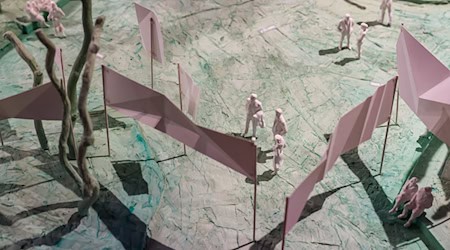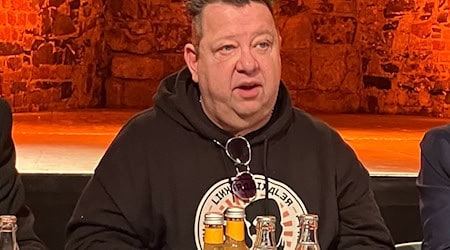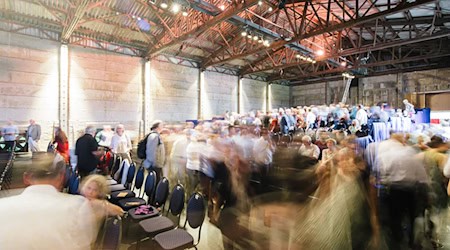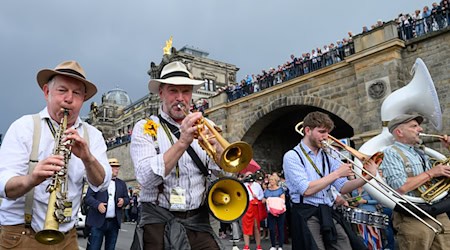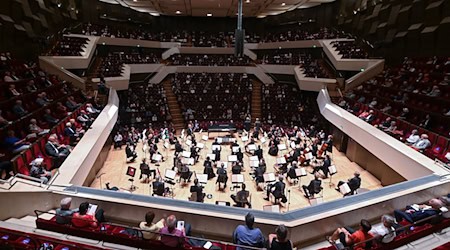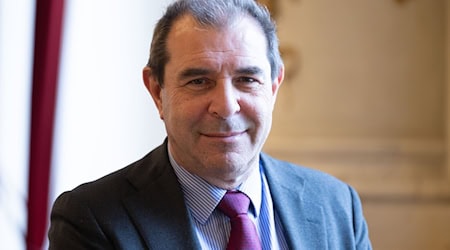One hit followed another - and the success seemed unstoppable. Karat was one of the most successful rock groups in the GDR. Then the Wall came down - and all the GDR bands lost their fans. Things slowly picked up again in the 90s. But a decade later, the band lost its singer. Herbert Dreilich died of cancer. A little later, the band name was no longer allowed to be used. But Karat overcame this hurdle too.
On Saturday (22 February), the quintet will be 50 years old - and will be celebrating with an anniversary concert in Berlin. "We'll be presenting new songs and paying tribute to old ones," singer Claudius Dreilich told the German Press Agency. However, none of the musicians who once performed on stage at the first Karat concert will be back.
Quick start in the 70s
Music history was written in the "Otto Buchwitz" cultural center in Heidenau near Dresden on February 22, 1975: Bassist Henning Protzmann, guitarist Ulrich Pexa, drummer Konrad Burkert, keyboardist Ulrich "Ed" Swillms and singers Hans-Joachim Neumann and Herbert Dreilich appeared on stage together for the first time. Their band is called Karat.
The new group is quickly played on GDR radio with their first own songs such as "Leute welch ein Tag". In 1976, the young Berlin band won the III. Interpreter Competition of the Art of Entertainment in Karl-Marx-Stadt. The first LP was released in 1978 and Karat made it to the top just three years after the band was founded.
Over "Seven Bridges" to the hit parade
A GDR television film becomes a huge stroke of luck. It's called "Über sieben Brücken musst du gehn". Keyboardist Ed Swillms, author of many of the band's hits, sets the title song of the same name to music. Karat wins the Grand Prix with the song at the 1978 International Schlager Festival in Dresden. The single made it to number 2 in the GDR annual hit parade - behind "König der Welt", also a ballad by Karat.
The single "Über sieben Brücken musst du gehn" is also sold by the "class enemy" west of the Wall. Peter Maffay hears the song on the radio and is so enthusiastic that he covers it.
This version also became a big hit - in West Germany. Maffay has been singing it from time to time with his friends from Karat since 1990. Many other successful singers have also covered "Sieben Brücken", such as Heinz Rudolf Kunze, Helene Fischer, Chris de Burgh and Roland Kaiser.
Foreign currency for the GDR
As the first GDR band, Karat was allowed to release all records in East and West from 1979. They were bought millions of times over and were a valuable source of foreign currency for the socialist state: 80 percent of the income from records and concerts in the West went into the GDR state coffers, as Claudius Dreilich reports.
The album "Der blaue Planet" was a huge success in 1982. The single "Jede Stunde / Falscher Glanz" climbs to the top ten in the FRG. Karat appears on Dieter Thomas Heck's ZDF hit parade, where they reach second place with "Jede Stunde". The GDR ballad kings also sing on "Wetten, dass...? Presenter Frank Elstner describes them as the "diamond of GDR pop groups".
The long shadow of the early years
When Karat is 15 years old, the GDR disappears. In 2025, it is 35 years of career in a united Germany. The Berliners are still referred to as the GDR band or the East band.
Dreilich has already given this a lot of thought and has come to the conclusion: "It can't be talked away. I see it as a seal of quality." Music by bands with GDR roots has become a genre in its own right. All the big Karat hits were written before the fall of the Wall.
Cancer death and K...!
After the fall of the Wall, Karat also experienced a dip in their career and their fans were drawn to Western music. But they soon return.
But in October 1997, singer Herbert Dreilich suffers a stroke at a concert. Around six months later, he was back on stage, but he only had a few years left. In March 2004, the Karat management announced that Dreilich was suffering from liver cancer. He died at the end of the same year - at the age of 62.
The next shock soon followed for the remaining musicians: Dreilich's widow forbade them to continue using the band name. The singer had secured the rights to the Karat brand from the German Patent and Trade Mark Office in 1998.
From 2006, the band called themselves "K...!". In 2007, the widow finally lost in court. Karat is called Karat again. Guitarist Bernd Römer later describes: "We were really devastated, we sat in the courtroom with our knees trembling."
Microphone instead of furniture store
Back to 2004: When his father falls ill with cancer, Claudius Dreilich receives a call from the band. He was asked if he could fill in as a singer. The musician's son had actually embarked on a different career, training as a hotel manager and retail salesman. He worked at Ikea and helped open the branch in Moscow.
For six months, he was unable to decide which path was the right one. "I grew up with Karat and loved this music," he explains. On the other hand, his job at the time put him on a firm financial footing.
In the end, he sought advice from the Karat drummer at the time. "He told me: 'You'll always be part of Karat. But if you don't do it, someone else will be on stage in the future". Then Claudius Dreilich, whose voice is amazingly similar to his father's, decided: "I have to at least try."
How much Karat is still in Karat?
Two social systems, two singers, two band names: Karat has had to reform again and again. There have been regular line-up changes, most recently in January 2023. "Michael Schwandt and Christian Liebig will not be continuing their journey with Karat," the other band members announced on their Facebook page. Both musicians had been in the band since GDR times.
Guitarist Bernd Römer is still with the band from the early era. He joined Karat in 1976. The current band is completed by keyboardist Martin Becker, bass guitarist Daniel Bätge and drummer Heiko Jung. The musicians are between 49 and 72 years old.
Anniversary tour: from Elphi to Westfalenhalle
50 years of Karat also means a new album and an extensive anniversary tour. Almost 60 concerts have been scheduled throughout Germany until December - including at the Elbphilharmonie in Hamburg and the Westfalenhalle in Dortmund.
On February 22, the band's birthday, the new album "Hohe Himmel" will be released. Dreilich describes the common ground of the new songs as follows: "It's all about people. About the dark side and the sunny side." And it still applies: "We work a lot with metaphors and cynical allusions. And there has to be a touch of lyricism."
Copyright 2025, dpa (www.dpa.de). All rights reserved


